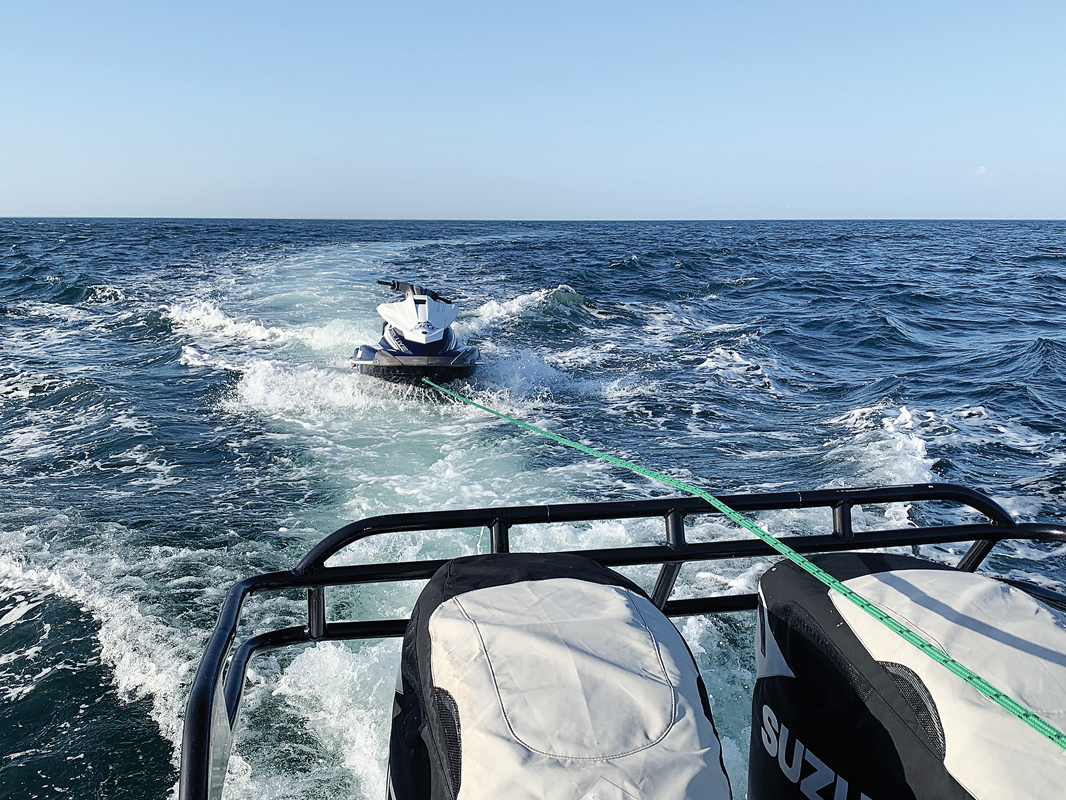HIGH-profile rescues over summer on the Mornington Peninsula have turned the spotlight on the importance of volunteer marine rescue groups and the lifesaving work they do.
With the 2022/23 Christmas period being one of the busiest on the peninsula for several years, thousands of locals and tourists have been taking to the water on everything from motorboats and jet skis to paddle boards and blow-up rafts.
Southern Peninsula Rescue Squad, which was formed more than 55 years ago after prime minister Harold Holt went missing near Portsea, is now so crucial to marine rescue on the southern peninsula and its volunteers are often the first to arrive when calls are made to emergency services.
The holiday season has just started, but so far this financial year the squad has been involved in more than 25 rescues, catching up quickly to last year’s total of close to 90, and involving 200 people. With the hot weather coming late this summer, there were 11 rescues in December alone.
Paddle boarders and kayakers, who are often young and inexperienced, are emerging as the “frequent flyers” of those needing rescue, with one incident involving four young paddle boarders swept offshore near Rosebud gaining international attention and highlighting the risks involved in paddlers not understanding the water.
On that occasion, the squad deployed two rescue boats and volunteers to support the search effort by Victorian Water Police, the Air Wing, ambulance helicopters and other local volunteer rescue boats.
After volunteers searched all night and the next morning police confirmed all four had been found alive after drifting for 12 hours and landing on Swan Island, near Queenscliff, cold and tired, but in good spirits.
There have been several paddle board incidents on the peninsula since then, with three young paddle boarders rescued last week by SPRS after a wind change forced the trio offshore from Rosebud.
Squad secretary Dennis Baguley said other common rescues involved boats and jet skis with no fuel or flat batteries, and that without volunteer rescue groups, the outcome for many people who get into trouble on the water could be very different.
Working to a roster, SPRS volunteers are always at the ready and a quiet day doing patrols or monitoring calls at the base in Blairgowrie can quickly turn to high drama on the water. The squad’s average call out time is 16 minutes from the time a call is received having to manned boats launched, with the highly trained and qualified members fully aware that delays of any kind can be fatal.
Baguley said the service was always looking for new volunteers, who are given Australian Maritime Safety Authority-approved training and skippers licenced. Volunteers are rostered for four-hour shifts.
“This service is so important, around 70 per cent of rescues on the bay are done by volunteer groups.”
Further up the bay, another group of volunteers from Volunteer Marine Rescue Mornington is also ready to respond to swimmers and boaters in distress.
The service, which has units at Mornington and Hastings, was formed in May 1980 when a boating accident that could be seen from land could not be attended due to the lack of a local response unit.
Secretary Rick Cooper said one of the most recent rescues this year involved two young girls on a paddle board off Mount Eliza. As the sunlight faded and temperatures, winds and tides changed, the girls were pushed a few miles offshore and were too exhausted to paddle back. Scared and cold, the girls managed to notify water police via an Apple watch, with the air wing locating them using a FLIR thermal camera and directing VMR volunteers where to pick them up.
“It was so lucky that one of the girls had an Apple watch and could raise the alarm, and it really highlights the need to never go out of the water without a way to contact people on shore,” Cooper said.
“At the very least a mobile phone in a plastic bag to keep it dry.”
On 30 December VMR was again at Mount Eliza when four men were left clinging to an Esky and a single life jacket to stay afloat after their boat sank about one kilometre offshore about 9pm. The men had an emergency beacon used to notify emergency services.
Another rescue involved a father and son who found themselves in trouble while one used a jetski to tow the other on a board to surf outside the mouth of Port Phillip near London Bridge, Portsea.
SPRS president Murray Grey said the tides near The Heads could run at 13 kilometres an hour, and he saw it as a dangerous activity.
As it happened, the tow rope got tangled and the two were using all their energy to keep the craft being caught in the current.
“It was dangerous for us too, and we almost had to leave the jet ski there but in a moment of luck we were able to get to the men and get to the jet ski and get it out,” Grey said.
Cooper said people did not realise how powerful the water and the wind could be near the heads.
Marine rescue groups – including the SPRS, volunteer Coast Guard based at Queenscliff and the Water Police – worked together to ensure people were safe on the water. But he said they would like all water users to be more aware of tides and weather conditions before taking to the water.
“I see the dilemma in expecting people using water craft to have training and licences like people who drive a car, because you may as well be asking surfers to have a surfing licence … it’s really down to education and awareness.”



